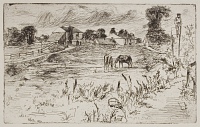Etchings Institutions search term: fitzwilliam museum
Landscape with Horses | ||
| Number: | 45 | |
| Date: | 1859 | |
| Medium: | etching and drypoint | |
| Size: | 128 x 205 mm | |
| Signed: | 'Whistler.' at lower left | |
| Inscribed: | '1859.' at lower left | |
| Set/Publication: | no | |
| No. of States: | 2 | |
| Known impressions: | 32 | |
| Catalogues: | K.36; M.35; T.23; W.46 | |
| Impressions taken from this plate (32) | ||
TECHNIQUE
Thomas commented, 'Second state is much worked upon, and like most of Mr Whistler's etchings, direct from nature'. 14 The composition was altered by the addition of the second horse in the second state and complex texture and details were then added in drypoint.
14: Thomas 1874 (cat. no. 23).
PRINTING
Over twenty of the second state have been found. Considering the condition of the plate in some of these (it was deeply pitted ( ) this is a quite surprising number. It was printed in black ink, early impressions being printed on buff or browned wove paper (
) this is a quite surprising number. It was printed in black ink, early impressions being printed on buff or browned wove paper ( ,
,  ,
,  ); cream 'modern' (post-1800) laid paper taken from a book (
); cream 'modern' (post-1800) laid paper taken from a book ( ); and laid paper with light brown fibres (
); and laid paper with light brown fibres ( ,
,  ). These slightly rough or textured papers complement the grainy pitting of the plate. An impression of the second state is on a similar laid paper with brown fibres (
). These slightly rough or textured papers complement the grainy pitting of the plate. An impression of the second state is on a similar laid paper with brown fibres ( ).
).
 ) this is a quite surprising number. It was printed in black ink, early impressions being printed on buff or browned wove paper (
) this is a quite surprising number. It was printed in black ink, early impressions being printed on buff or browned wove paper ( ,
,  ,
,  ); cream 'modern' (post-1800) laid paper taken from a book (
); cream 'modern' (post-1800) laid paper taken from a book ( ); and laid paper with light brown fibres (
); and laid paper with light brown fibres ( ,
,  ). These slightly rough or textured papers complement the grainy pitting of the plate. An impression of the second state is on a similar laid paper with brown fibres (
). These slightly rough or textured papers complement the grainy pitting of the plate. An impression of the second state is on a similar laid paper with brown fibres ( ).
).Other later impressions, still in black, are on a wide range of papers. European papers include ivory laid papers with the Strasbourg Lily watermark ( ) and 'DAV' (
) and 'DAV' ( ); and cream 'antique' laid page from a book, with a large watermark, possibly the royal crest with the motto 'Honi soit ...' (
); and cream 'antique' laid page from a book, with a large watermark, possibly the royal crest with the motto 'Honi soit ...' ( ). Asian papers include good quality, heavy-weight textured cream Japanese 'laid' (
). Asian papers include good quality, heavy-weight textured cream Japanese 'laid' ( ); opaque light-weight Asian 'laid', possibly proofing paper (
); opaque light-weight Asian 'laid', possibly proofing paper ( ); dark cream chine collé (
); dark cream chine collé ( ); thin ivory Japan tissue, with a chalky surface (
); thin ivory Japan tissue, with a chalky surface ( ); and good quality dark ivory Japanese wove paper (
); and good quality dark ivory Japanese wove paper ( ).
).
 ) and 'DAV' (
) and 'DAV' ( ); and cream 'antique' laid page from a book, with a large watermark, possibly the royal crest with the motto 'Honi soit ...' (
); and cream 'antique' laid page from a book, with a large watermark, possibly the royal crest with the motto 'Honi soit ...' ( ). Asian papers include good quality, heavy-weight textured cream Japanese 'laid' (
). Asian papers include good quality, heavy-weight textured cream Japanese 'laid' ( ); opaque light-weight Asian 'laid', possibly proofing paper (
); opaque light-weight Asian 'laid', possibly proofing paper ( ); dark cream chine collé (
); dark cream chine collé ( ); thin ivory Japan tissue, with a chalky surface (
); thin ivory Japan tissue, with a chalky surface ( ); and good quality dark ivory Japanese wove paper (
); and good quality dark ivory Japanese wove paper ( ).
). The plate was steel-faced and may have been printed after Whistler's death.
